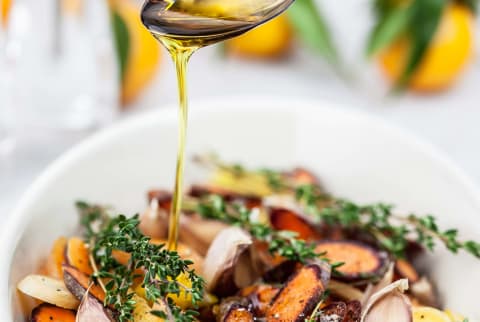Advertisement
3 Tips For Buying High-Quality Olive Oil (Beyond "Extra Virgin")


Olive oil is a common pantry item and probably one of your most reached-for ingredients—even more so if you're following a Mediterranean diet. Its heart-healthy benefits and high polyphenol content make it a great cooking oil to add to your rotation. But it's important to know that not all olive oils are created equal, so it's crucial to shop smart.
While true extra-virgin olive oil is packed with good-for-you compounds, it turns out that finding that "extra virgin" on a label might not tell the whole story. Here's what to know.
Why you need to read beyond "extra-virgin."
The truth of the matter is that just because something is labeled "extra-virgin" doesn't mean it still is when you actually get your hands on it. That's because factors like exposure to light and air, as well as the simple passage of time, allow the oil to oxidize. As it does, it loses the characteristics that qualify it as extra-virgin olive oil in the first place.
According to the USDA, to be called extra virgin, the olive oil must have both "excellent flavor and odor" and "a free fatty acid content, expressed as oleic acid, of not more than 0.8 grams per 100 grams." Essentially, it's not just about the taste—it's also about the chemical makeup of the oil.
In a 2010 study, researchers at the University of California–Davis assessed how much of the EVOO on shelves was truly extra virgin—and found that many imported varieties did not meet the standards for chemical makeup and sensory qualities (including flavor and aroma) that are set by the U.S. Department of Agriculture.
"When you buy a bottle labeled extra virgin, you are buying an olive oil that, at the moment of the pressing, has been declared extra virgin," explains Armando Manni, olive oil producer and founder of Manni Oil. "In that moment, it's fresh—two weeks later, it's oxidized. The polyphenols sacrifice themselves, one by one, in the bottle, to protect the fat cells from oxidation."
More recent studies have confirmed that factors such as oxygen, temperature, and light exposure can lead to the degradation of the oil. A 2018 study published in the Journal of Food Quality found that even in varieties with high antioxidant levels, like EVOO, olive oil is prone to oxidation due to external factors.
Because the polyphenols in olive oil1 contribute many of its benefits, purchasing extra-virgin olive oil with the highest polyphenol content is the goal. However, because "extra virgin" refers only to the status of the oil at bottling, exploring more of the label (and bottle!) is the best way to make sure it's still rich as can be in polyphenols.
Expert tips for selecting a high-quality olive oil:
Look for a small dark or opaque bottle.
Before anything else, zero in on dark bottles. "You should never buy a bottle of extra-virgin olive oil in a transparent container," says Manni. "The oil will be exposed to UV rays and oxidize very quickly, losing its extra-virgin properties right away." Instead, research shows that storing oil in greenish glass2 effectively helps slow down the oxidation process.
And while you may be tempted to buy a larger bottle in an effort to save money, the larger bottles also mean it inherently spends more time on your shelf, and the olive has longer to deteriorate before it hits your food. If you do opt for a larger bottle, consider getting a small bottle with opaque sides and a snug lid to decant into, so the larger bottle can stay closed and in a dark place to limit exposure to the forces that speed up deterioration.
2. Check for sediment.
If you've ever picked up a bottle of olive oil and noticed something granular circulating, there are two reasons you might want to put it back on the shelf. First of all, if you can see through the bottle, it's probably already not one you want. And the second reason relates to the sediment itself.
"If you find sediment in the bottle of EVOO, it means that the oil has not been filtered," says Manni. "If the oil is unfiltered (or not filtered properly), it will accelerate the natural oxidation of the extra-virgin olive oil."
Look for a label with details.
What details should you be looking for? Manni has a few suggestions:
- A label that indicates the year of the harvest/production: "You'll find that most bottles don't specify," he says. But knowing when it was harvested helps you know how long it has spent on the shelf—and how long the polyphenols have had to break down.
- A bottle that has the organic seal and the DOP or PGI designation: DOP stands for Denominazione di Origine Protetta (Protected Designation of Origin), while PIG stands for Protected Geographical Indication. "The DOP designation ensures that products are locally grown and packaged. It's a guarantee that the food was made by local farmers and artisans, using traditional methods," shares Manni. "Both designations provide quality assurance and indicate where the oil is coming from."
Armed with this expert perspective, you can now shop for olive oils with confidence—and if you're now wondering if you should just switch to avocado oil instead, check out this comparison of the two popular options.